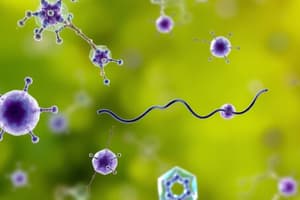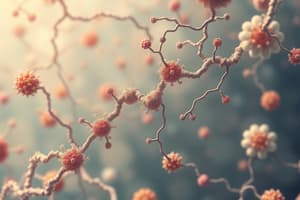Podcast
Questions and Answers
Biochemistry is the study of chemical processes within and relating to ______.
Biochemistry is the study of chemical processes within and relating to ______.
living organisms
Key types of biomolecules include carbohydrates, lipids, proteins, and ______.
Key types of biomolecules include carbohydrates, lipids, proteins, and ______.
nucleic acids
Carbohydrates are primarily composed of carbon, hydrogen, and ______.
Carbohydrates are primarily composed of carbon, hydrogen, and ______.
oxygen
Lipids are crucial for energy storage, cell membrane structure, and ______ production.
Lipids are crucial for energy storage, cell membrane structure, and ______ production.
Proteins are polymers of ______ acids.
Proteins are polymers of ______ acids.
DNA stores genetic information, while RNA participates in ______ synthesis.
DNA stores genetic information, while RNA participates in ______ synthesis.
Enzyme kinetics is the study of the rates of ______-catalyzed reactions.
Enzyme kinetics is the study of the rates of ______-catalyzed reactions.
Cellular respiration converts glucose into ______, which is energy for cellular processes.
Cellular respiration converts glucose into ______, which is energy for cellular processes.
Proteins have primary, secondary, tertiary, and ______ structures.
Proteins have primary, secondary, tertiary, and ______ structures.
DNA structure is a double helix with ______ pairing.
DNA structure is a double helix with ______ pairing.
Cells regulate metabolic pathways to maintain ______.
Cells regulate metabolic pathways to maintain ______.
Pharmaceuticals are developed through understanding biochemical ______.
Pharmaceuticals are developed through understanding biochemical ______.
Industrial processes employ biochemical principles for production and ______.
Industrial processes employ biochemical principles for production and ______.
Flashcards
Protein Structure
Protein Structure
Proteins have levels of structure (primary, secondary, tertiary, and quaternary) that determine their function.
DNA Structure
DNA Structure
DNA is a double helix with specific base pairings.
Metabolic Regulation
Metabolic Regulation
Cells control biochemical pathways to maintain a stable internal environment.
Protein Denaturation
Protein Denaturation
Signup and view all the flashcards
Biochemical Applications
Biochemical Applications
Signup and view all the flashcards
Biochemistry
Biochemistry
Signup and view all the flashcards
Carbohydrates
Carbohydrates
Signup and view all the flashcards
Proteins
Proteins
Signup and view all the flashcards
Lipids
Lipids
Signup and view all the flashcards
Metabolic Pathways
Metabolic Pathways
Signup and view all the flashcards
Enzyme Kinetics
Enzyme Kinetics
Signup and view all the flashcards
Cellular Respiration
Cellular Respiration
Signup and view all the flashcards
Nucleic Acids
Nucleic Acids
Signup and view all the flashcards
Study Notes
Introduction to Biochemistry
- Biochemistry is the study of chemical processes within and relating to living organisms.
- It encompasses a wide range of topics, including the structure and function of biomolecules, metabolic pathways, and the regulation of cellular processes.
- It is a fundamental science for understanding life's processes at a molecular level.
Biomolecules
- Biomolecules are organic molecules found in living organisms.
- Key types include carbohydrates, lipids, proteins, and nucleic acids.
- These molecules carry out essential functions in living systems.
Carbohydrates
- Primarily composed of carbon, hydrogen, and oxygen.
- Classified into monosaccharides (simple sugars), disaccharides (two monosaccharides), and polysaccharides (many monosaccharides).
- Provide energy to cells and form structural components.
- Examples include glucose, fructose, sucrose, and starch.
Lipids
- Diverse group of hydrophobic molecules.
- Include fats, oils, waxes, phospholipids, and steroids.
- Crucial for energy storage, cell membrane structure, and hormone production.
- Examples include triglycerides, phospholipids, and cholesterol.
Proteins
- Polymers of amino acids.
- Diverse functions, including catalysis, structure, transport, and defense.
- Enzymes are proteins that catalyze biochemical reactions.
- Examples include enzymes, hormones, antibodies, and structural proteins.
Nucleic Acids
- Deoxyribonucleic acid (DNA) and ribonucleic acid (RNA).
- Carry genetic information.
- DNA stores genetic information.
- RNA participates in protein synthesis and other processes.
Metabolic Pathways
- Series of interconnected biochemical reactions.
- Essential for energy production, synthesis of biomolecules, and breakdown of waste products.
- Often regulated to maintain homeostasis within cells.
- Examples include glycolysis, the citric acid cycle, and the electron transport chain. These pathways are critical for energy production in cells.
Enzyme Kinetics
- Study of the rates of enzyme-catalyzed reactions.
- Factors like substrate concentration, temperature, and pH affect the reaction rate.
- Enzymes bind to specific substrates at an active site, forming an enzyme-substrate complex.
Cellular Respiration
- The process by which cells convert glucose into ATP, which is energy for cellular processes.
- Involves glycolysis, Krebs cycle, and electron transport chain.
- Oxygen is often the final electron acceptor.
- The overall goal is energy production.
Protein Structure and Function
- Proteins have primary, secondary, tertiary, and quaternary structures.
- The structures determine a protein's function.
- Protein folding is vital for proper function.
- Denaturation causes loss of function.
Nucleic Acid Structure and Function
- DNA structure is a double helix with base pairing.
- RNA has various structures, with different types having different functions.
- DNA replication, transcription, and translation are central to genetic processes.
Regulation of Biochemical Pathways
- Cells regulate metabolic pathways to maintain homeostasis.
- This is often through feedback loops.
- Hormones and other signaling molecules often play a crucial role.
Applications of Biochemistry
- Biochemistry is extensively applied in medicine, agriculture, and industry.
- Pharmaceuticals are developed through understanding biochemical reactions.
- Agricultural practices use biochemical techniques to improve crop yields.
- Industrial processes employ biochemical principles for production and sustainability.
- It is important for understanding diseases and developing treatments.
Studying That Suits You
Use AI to generate personalized quizzes and flashcards to suit your learning preferences.



